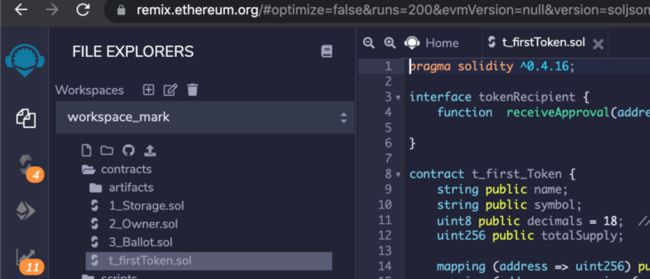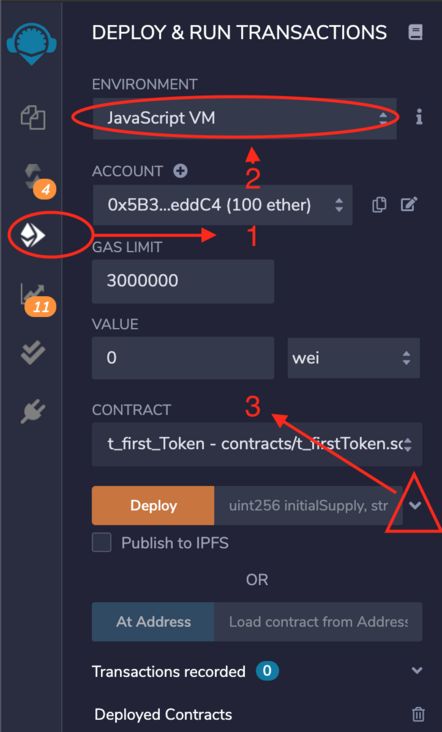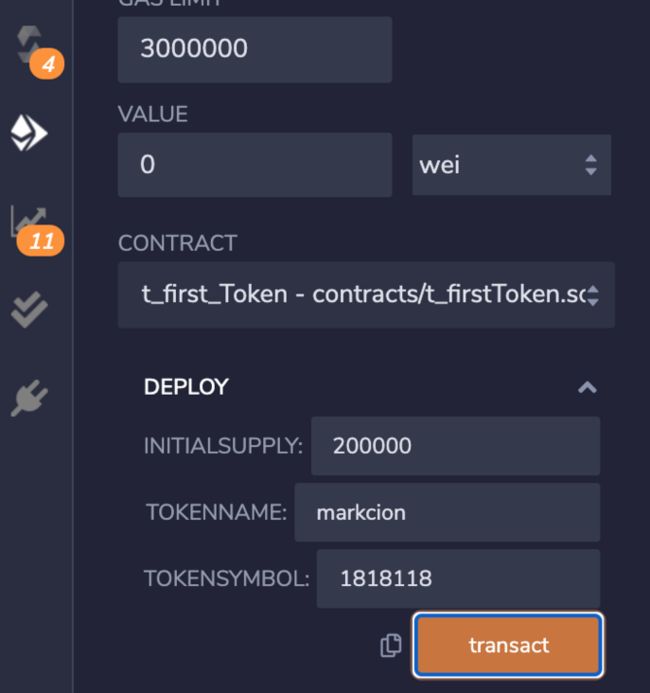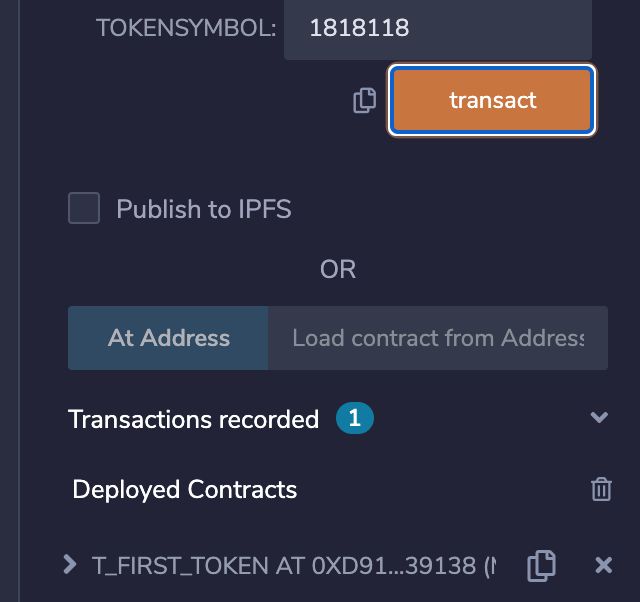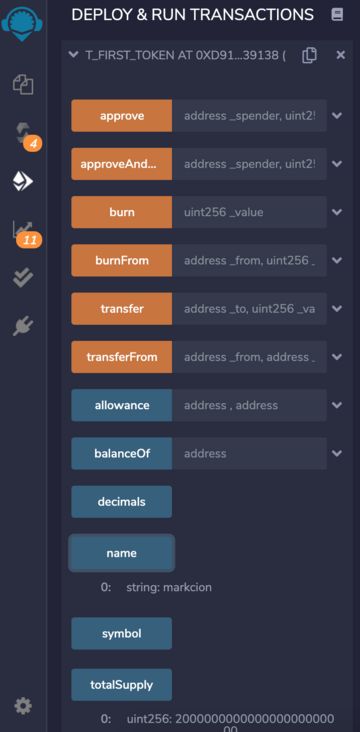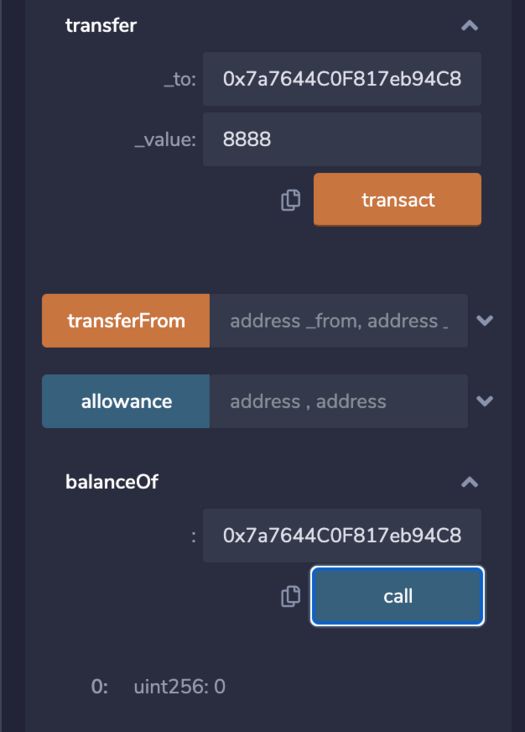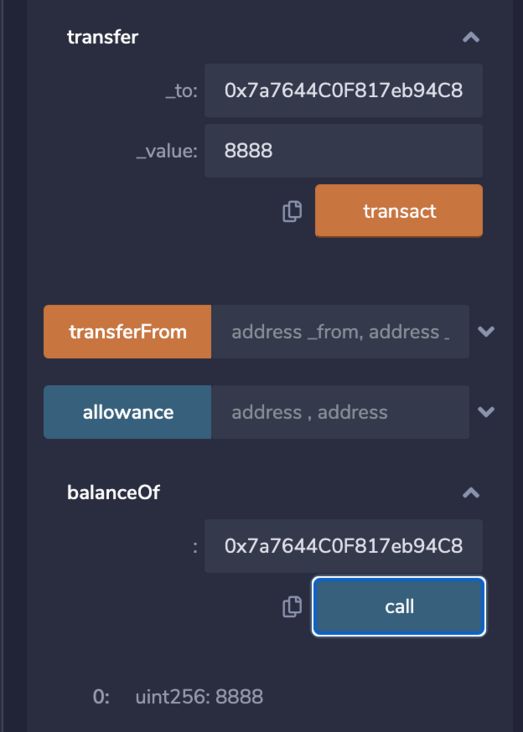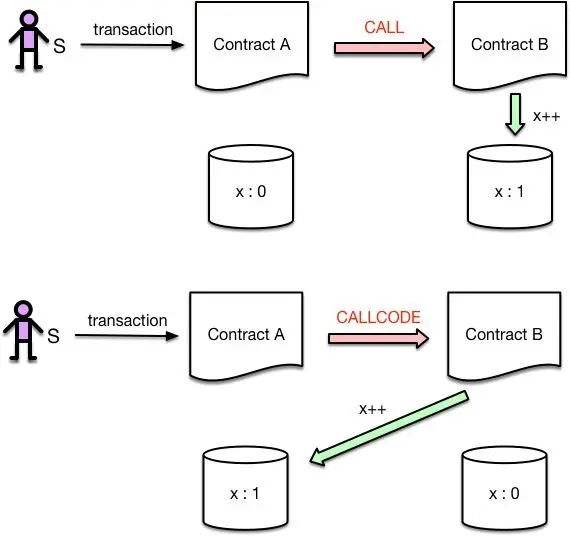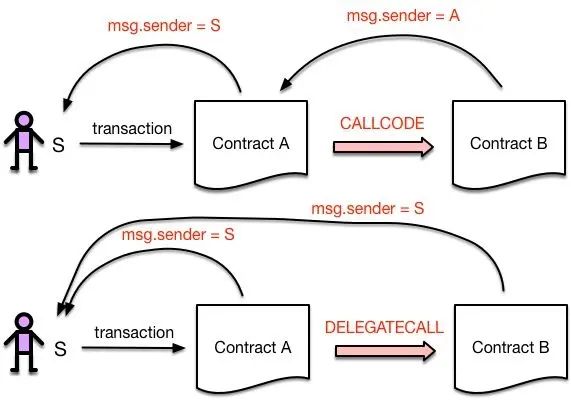Solidity 是一门面向合约的、为实现智能合约而创建的高级编程语言,为了体验Solidity语言在智能合约应用场景广泛性,跟着Solidity官方文档和中文社区学习做两个简单例子以熟悉安装、配置、使用集成开发环境和基础智能合约实际应用。
标准以太坊货币例子合约熟悉开发环境
任何语言都一样,让我们来快速体验一下Solidity的helloworld吧,把前几天学到的货币合同copy来直接上环境一睹为快:
- 访问https://remix.ethereum.org/网站,初始加载比较慢,可以随便点点最左边的图标看看有些什么功能;
- 点File explorers在default_workspace边上,点Create创建一个新空间workspace_mark;点Create New File在contracts下创建一个合约;
- 将如下代码保存在合约中;
pragma solidity ^0.4.16;
interface tokenRecipient {
function receiveApproval(address _from, uint256 _value, address _token, bytes _extraData) external;
}
contract t_first_Token {
string public name;
string public symbol;
uint8 public decimals = 18; // 18 是建议的默认值
uint256 public totalSupply;
mapping (address => uint256) public balanceOf; //
mapping (address => mapping (address => uint256)) public allowance;
event Transfer(address indexed from, address indexed to, uint256 value);
event Burn(address indexed from, uint256 value);
function t_first_Token(uint256 initialSupply, string tokenName, string tokenSymbol) public {
totalSupply = initialSupply * 10 ** uint256(decimals);
balanceOf[msg.sender] = totalSupply;
name = tokenName;
symbol = tokenSymbol;
}
function _transfer(address _from, address _to, uint _value) internal {
require(_to != 0x0);
require(balanceOf[_from] >= _value);
require(balanceOf[_to] + _value > balanceOf[_to]);
uint previousBalances = balanceOf[_from] + balanceOf[_to];
balanceOf[_from] -= _value;
balanceOf[_to] += _value;
Transfer(_from, _to, _value);
assert(balanceOf[_from] + balanceOf[_to] == previousBalances);
}
function transfer(address _to, uint256 _value) public returns (bool) {
_transfer(msg.sender, _to, _value);
return true;
}
function transferFrom(address _from, address _to, uint256 _value) public returns (bool success) {
require(_value <= allowance[_from][msg.sender]); // Check allowance
allowance[_from][msg.sender] -= _value;
_transfer(_from, _to, _value);
return true;
}
function approve(address _spender, uint256 _value) public
returns (bool success) {
allowance[msg.sender][_spender] = _value;
return true;
}
function approveAndCall(address _spender, uint256 _value, bytes _extraData) public returns (bool success) {
tokenRecipient spender = tokenRecipient(_spender);
if (approve(_spender, _value)) {
spender.receiveApproval(msg.sender, _value, this, _extraData);
return true;
}
}
function burn(uint256 _value) public returns (bool success) {
require(balanceOf[msg.sender] >= _value);
balanceOf[msg.sender] -= _value;
totalSupply -= _value;
Burn(msg.sender, _value);
return true;
}
function burnFrom(address _from, uint256 _value) public returns (bool success) {
require(balanceOf[_from] >= _value);
require(_value <= allowance[_from][msg.sender]);
balanceOf[_from] -= _value;
allowance[_from][msg.sender] -= _value;
totalSupply -= _value;
Burn(_from, _value);
return true;
}
}- 选择Solidity Compiler出新界面后,点击Compile t_first_token.sol编译智能合同,点击Publish on Swarm将智能合同发表;
- Deploy按下图三步发布合同到JavaScript vm中;
发布初始构造需要货币总量、币名和币编号。
- 操作JavaScript vm中合同的函数并查询变量;
使用MetaMask钱包等的地址0x7a7644C0F817eb94C823781E20B2F2EcE2916967调用(JavaScript vm要进行格式验证)。
- 这样Solidity编辑的智能合同,一个仿以太币就show出来了。
合同间调用例子看智能合约的变化
- 学习生产环境的配置看考Hardhat + VS code(https://www.yuque.com/bernieg...)文档
安装运行hardhat:
npm install --save-dev @nomiclabs/hardhat-waffle ethereum-waffle chai @nomiclabs/hardhat-ethers ethers
npx hardhat
由上到下运行如下命令:
npx hardhat accounts
npx hardhat compile
npx hardhat test
npx hardhat node
node scripts/sample-script.js
npx hardhat help
npx hardhat test可以得到真正的helloworld合同输出
Deploying a Greeter with greeting: Hello, world!
Changing greeting from 'Hello, world!' to 'Hola, mundo!'
npx hardhat node
Started HTTP and WebSocket JSON-RPC server at http://127.0.0.1:8545/
- 将上面t_first_token.sol合同转移到hardhat环境中运行
合同升级到0.7+,修改相应代码如下( //修改版本升级)
-wanning:加license标签,constrctor 去掉public修饰
-error:版本,加memory修饰,比较adress,this 被adress强制转换等
//SPDX-License-Identifier: Unlicense
//修改版本升级
pragma solidity >=0.7.0;//修改版本升级
interface tokenRecipient {
function receiveApproval(address _from, uint256 _value, address _token, bytes memory _extraData) external; //修改版本升级
}
contract t_first_token {
string public name;
string public symbol;
uint8 public decimals = 18; // 18 是建议的默认值
uint256 public totalSupply;
mapping (address => uint256) public balanceOf; //
mapping (address => mapping (address => uint256)) public allowance;
event Transfer(address indexed from, address indexed to, uint256 value);
event Burn(address indexed from, uint256 value);
//function t_first_token(uint256 initialSupply, string memory tokenName, string memory tokenSymbol) public {
constructor(uint256 initialSupply, string memory tokenName, string memory tokenSymbol) {//修改版本升级
totalSupply = initialSupply * 10 ** uint256(decimals);
balanceOf[msg.sender] = totalSupply;
name = tokenName;
symbol = tokenSymbol;
}
function _transfer(address _from, address _to, uint _value) internal {
require(_to != 0x0000000000000000000000000000000000000000);//修改版本升级
require(balanceOf[_from] >= _value);
require(balanceOf[_to] + _value > balanceOf[_to]);
uint previousBalances = balanceOf[_from] + balanceOf[_to];
balanceOf[_from] -= _value;
balanceOf[_to] += _value;
emit Transfer(_from, _to, _value);
assert(balanceOf[_from] + balanceOf[_to] == previousBalances);
}
function transfer(address _to, uint256 _value) public returns (bool) {
_transfer(msg.sender, _to, _value);
return true;
}
function transferFrom(address _from, address _to, uint256 _value) public returns (bool success) {
require(_value <= allowance[_from][msg.sender]); // Check allowance
allowance[_from][msg.sender] -= _value;
_transfer(_from, _to, _value);
return true;
}
function approve(address _spender, uint256 _value) public
returns (bool success) {
allowance[msg.sender][_spender] = _value;
return true;
}
function approveAndCall(address _spender, uint256 _value, bytes memory _extraData) public returns (bool success) {//修改版本升级
tokenRecipient spender = tokenRecipient(_spender);
if (approve(_spender, _value)) {
spender.receiveApproval(msg.sender, _value, address(this), _extraData);//修改版本升级
return true;
}
}
function burn(uint256 _value) public returns (bool success) {
require(balanceOf[msg.sender] >= _value);
balanceOf[msg.sender] -= _value;
totalSupply -= _value;
emit Burn(msg.sender, _value);
return true;
}
function burnFrom(address _from, uint256 _value) public returns (bool success) {
require(balanceOf[_from] >= _value);
require(_value <= allowance[_from][msg.sender]);
balanceOf[_from] -= _value;
allowance[_from][msg.sender] -= _value;
totalSupply -= _value;
emit Burn(_from, _value);
return true;
}
}3.添加计数合同,更新t_first_token.sol添加变量
test测试合同中的函数调用
const { expect } = require("chai");
describe("Greeter", function() {
it("Should return the new greeting once it's changed", async function() {
const Greeter = await ethers.getContractFactory("Greeter");
const greeter = await Greeter.deploy("Hello, world!");
await greeter.deployed();
expect(await greeter.greet()).to.equal("Hello, world!");
const setGreetingTx = await greeter.setGreeting("Hola, mundo!");
// wait until the transaction is mined
await setGreetingTx.wait();
expect(await greeter.greet()).to.equal("Hola, mundo!");
});
});
describe("t_first_token", function() {
it("Should return mane", async function() {
const _t_first_token = await ethers.getContractFactory("t_first_token");
const t_first_token = await _t_first_token.deploy(2000,"markcion","18188");
await t_first_token.deployed();
expect(t_first_token.burn(111));
});
});
describe("t_first_token/Greeter", function() {
it("Should return t_first_token/Greeter", async function() {
const _t_first_token = await ethers.getContractFactory("t_first_token");
const t_first_token = await _t_first_token.deploy(2000,"markcion","18188");
await t_first_token.deployed();
const Greeter = await ethers.getContractFactory("Greeter");
const greeter = await Greeter.deploy("Hello, world!");
await greeter.deployed();
expect(t_first_token.inc());
expect(greeter.inc());
expect(greeter.inc());
});
});npx hardhat test
Greeter
Deploying a Greeter with greeting: Hello, world!
Changing greeting from 'Hello, world!' to 'Hola, mundo!'
✓ Should return the new greeting once it's changed (1098ms)
t_first_token
Deploying a tokenName: markcion
✓ Should return mane (122ms)
t_first_token/Greeter
burn-totalSupply: 1999999999999999999889
Deploying a tokenName: markcion
t_first_token m: 2
Deploying a Greeter with greeting: Hello, world!
✓ Should return t_first_token/Greeter (173ms)
3 passing (1s)
Greeter m: 2
Greeter m: 3
- 调用关系并简单分析
在Solidity中,如果只是为了代码复用,我们会把公共代码抽出来,部署到一个library中,后面就可以像调用C库、Java库一样使用了。但是library中不允许定义任何storage类型的变量,这就意味着library不能修改合约的状态。如果需要修改合约状态,我们需要部署一个新的合约,这就涉及到合约调用合约的情况。
合约调用合约有下面4种方式:
1) CALL
2) CALLCODE
3) DELEGATECALL
4) STATICCALL
CALL vs. CALLCODE
CALL和CALLCODE的区别在于:代码执行的上下文环境不同。
具体来说,CALL修改的是被调用者的storage,而CALLCODE修改的是调用者的storage。
CALLCODE vs. DELEGATECALL
实际上,可以认为DELEGATECALL是CALLCODE的一个bugfix版本,官方已经不建议使用CALLCODE了。
CALLCODE和DELEGATECALL的区别在于:msg.sender不同。
具体来说,DELEGATECALL会一直使用原始调用者的地址,而CALLCODE不会。
将钱包和合约打通(高阶 持续更新)
Solidity语言特点及学习差异列表 (持续更新)
- solidity语法注意事项
1)所有的标识符(合约名称,函数名称和变量名称)都只能使用ASCII字符集。UTF-8编码的数据可以用字符串变量的形式存储。(小心使用Unicode文本,因为有些字符虽然长得相像(甚至一样),但其字符码是不同的,其编码后的字符数组也会不一样。)
2)变量
uint (256位无符号整数),块的概念无处不在。
address 类型是一个160位的值,且不允许任何算数操作。这种类型适合存储合约地址或外部人员的密钥对。
mapping (address => uint) 黑匣子哈希表(无key集合访问)。
3)合约版本变化,语法变化很大,使用编译版本限制。
4)“undefined”或“null”值的概念在Solidity中不存在,但是变量声明后将有默认初始值,其初始值字节表示全部为零。任何类型变量的“默认值”是其对应类型的典型“零状态”。例如, bool 类型的默认值是 false 。 uint 或 int 类型的默认值是 0 。对于静态大小的数组和 bytes1 到 bytes32 ,每个单独的元素将被初始化为与其类型相对应的默认值。 最后,对于动态大小的数组 bytes 和 string 类型,其默认缺省值是一个空数组或空字符串。
欢迎区块链行业志同道合的小伙伴添加小极微信,加入blockgeek区块链技术交流群,共同推动区块链技术普及和发展~
